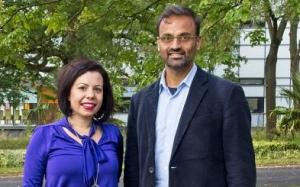You are here
- Home
- Bringing space science down to earth
Bringing space science down to earth
5 March 2020

When The Open University won £6.7 million for Astrobiology research, key to that success was the International Development and Inclusive Innovation strategic research area. But what has international development got to do with outer space?
“Astrobiology doesn’t immediately strike you as a subject that Arts and Social Sciences engage with, but it is at the heart of solving some of the pressing global challenges like food insecurity, disaster relief and infectious diseases.”
So says Dr Shonil Bhagwat (pictured right), lead academic on the International Development and Inclusive Innovation (IDII) workstream of AstrobiologyOU, a recently expanded team of researchers in space science, international development, and citizenship and governance.
Although only around £500,000 of the £6.7 million grant from Research England is earmarked for the international development workstream, without the IDII input the grant ‘would not have happened’, Dr Bhagwat says.
“There are a lot of groups doing astrobiology research, but we are the only one thinking about the societal relevance and implications.”
Appropriate technology?
A key area of interest for the IDII workstream is how space technology can benefit more people by being adapted to development and humanitarian uses on earth, he said.
“Space technology is very broadly defined, it includes earth-orbiting satellites but also sensors, probes and robotics which are designed to survive in very harsh conditions and pack a lot of information in a small space.
“Something like a Mars Rover could be adapted to enter collapsed buildings and search for people trapped after earthquakes, or compact technology like sensors could be used to detect pathogens or contaminated water.”
The IDII team will be working closely with AstrobiologyOU scientist Dr Geraint Morgan, who is already re-purposing sensors developed for detecting the chemical signals of extraterrestrial life, to a range of medical and commercial uses.
They will bring a particular focus on whether the technology is appropriate, affordable and culturally acceptable, and how to ensure it is adopted by local communities.
'Analogue' site ethics
Technology is one strand of IDII’s remit; a second key area will be the ethical implications of research and innovation activities, as AstrobiologyOU Research Fellow Dr Alessandra Marino (pictured left) explains.
“Astrobiology fieldwork makes use of ‘analogue sites’– very harsh Earth environments which are the closest they can get to the conditions in space.
“Often the assumption is that these places are ‘barren’, but in fact there are often indigenous people and local communities who have a long-term relationship with the land, they may derive their livelihood from it, or regard it as sacred.
“We need to find a relationship with the people and the land that is respectful of indigenous and local knowledges and productive for both sides.”
Dr Marino is developing a set of ethical principles which will guide the scientists’ fieldwork, and the IDII team will work with artists to promote engagement between scientists and local communities.
Pointing to the future
AstrobiologyOU is a model interdisciplinary venture – covering not only scientific, technological, societal, cultural and ethical dimensions but even the legal, with the governance workstream looking at issues like planetary protection.
And this, says Dr Bhagwat, is a pointer to the future.
“Big investments now come with a requirement for interdisciplinarity – that is the direction of travel for all the research councils.
“If you want to do something really innovative, you have to talk to people outside your discipline.”
Share this page:
Monthly Archive
- March 2024 (1)
- November 2023 (1)
- February 2023 (1)
- January 2023 (1)
- November 2022 (1)
- October 2022 (1)
Contact us
To find out more about our work, or to discuss a potential project, please contact:
International Development Research Office
Faculty of Arts and Social Sciences
The Open University
Walton Hall
Milton Keynes
MK7 6AA
United Kingdom
T: +44 (0)1908 858502
E: international-development-research@open.ac.uk
.jpg)